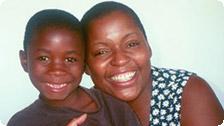by Kisha Montgomery
I would never dare underestimate the pain and loss Hurricane Katrina has caused. Watching it secondhand has caused me immeasurable heartache. Yet as I try to make sense of it all, it occurrs to me that there is an opportunity in this this hurricane.
They blame the floods for the death and destruction, but I believe that the waters were not those of death, but of life, and that they give us an opportunity to claim responsibility for our individual and collective lives. Waters that revealed how the poor live and are treated in this society. Waters that exposed political apathy and the status, view, and treatment of poor people of color in our country. Waters that laid bare how we treat and care for those who carry our ancestral memory and those that have gone before: our elders.
Our sister Katrina provides us the opportunity to ask the questions, to spark the dialogues on race, class, privilege, and environmental destruction in circles and corners that might possibly have held them without her. The bishop of my church, City of Refuge, told us how she asked the Spirit, “Why did you let this happen?” She heard in her spirit, “What makes you think that I did it?”
Yes, we are responsible.
Katrina gives us the opportunity to ask the hard questions. How is it possible for a storm to become so strong so quickly? What is happening to the earth? How is it possible that that a state that has millions of dollars a year to spend on tourism could also have a mass of people who did not have the means to leave, who were so exposed to the elements due to lack of sufficient infrastructure? How is it that one of the richest nations in the world could have so many people living in such squalor and deprivation that they needed to steal to survive? How is it possible for other citizens of that same country to just move to another state and buy houses, rent hotel rooms, and start their businesses anew without even blinking an eye?
Katrina gives us an opportunity to contemplate why people would be named and treated like refugees when they are citizens of this country. How can we criminalize poor people of color in the midst of chaos? We have to wonder who the true criminals are: those who react to their desperation or those of us who allowed it to happen, whether consciously or unconsciously.
Katrina also gives us an opportunity to contemplate what it means for media to be responsible or irresponsible. Katrina gives us the opportunity to ask the questions and to live the answer—because in the wake of the victims’ deaths, we are aware that we are very much alive, and that we can—and must—make different choices if we are to survive as a human race.
Katrina gives us the opportunity to take a look at priorities of the current administration and the corresponding shortages due to chasing the terrorist bogyman. It would take a woman, to help us humble ourselves to accept help from our global neighbors, necessary due to the current priorities of the administration. Katrina presents an opportunity for the isolated, often ego-based nation with a superiority complex to contemplate what it means to be part of the global family. Is it possible that them there foreign types may one day be needed in tragedy? Who would have ever thought that Cuba would send in doctors? Ain’t that somethin’ when the poorest nations give to us—despite U.S. policies and positions that support their poverty?
Katrina also gives people the opportunity to say “I am responsible,” and to take care of each other; to take care of the neglected and to remember our humanity—not just in the wake of this tragedy, but in our everyday lives. There were many rivers—environmental destruction, racism, classism, neglect of our elders, and neglect of our citizens—that created a context for there to be as much destruction as there was.
As the waters are dried up, beyond the dead bodies and collapsed buildings, we are exposed to the disparities in our own backyard that were hidden or ignored. As we clean up the wreckage, there is the opportunity for people who have long been neglected to finally receive the care they need. An opportunity for us as a nation to clean up the wreckage of the legacies of race, class, ability, and age disparities that haunt this nation. Katrina gives us the opportunity to examine those disparities in our individual actions, in our own communities, and to move from apathy to action in our small and larger world.
Waters flowing through our collective conscience bring us back to our individual power and what it means to use it, share it, and be responsible for it individually, locally, nationally, and globally in our daily lives. Katrina was a perfect storm—because she gave us the opportunity to ask the questions and to live the answers. Because in the death of the victims, we are aware of our own lives and our inherent power to be of service to each other, the earth, and our global family.
* * * *
Kisha “Nomvuyo” Montgomery, is a native of New York and the last of seven children. From October 2001 to March 2002, Kisha participated in a six-month solo and self-funded tour of advocacy-focused non-governmental organizations in East and Southern Africa, where she participated predominantly in home-based stays. Kisha was given the name Nomvuyo, which means “mother of happiness,” because as one township resident of South Africa articulated, “She makes us happy.”
Kisha worked as a coordinator for two-and-a-half years for a welfare-to-work program that empowered women to achieve economic self-sufficiency through employment at law firms. She also worked as an advocate for survivors of domestic violence for a year after graduating from Syracuse University College of Law in 1996.
Committed to individual and community empowerment and development, Kisha worked as the Africa Program Director at International Development Exchange (IDEX), a social change organization based in San Francisco, California, from August 2002 to June 2003.
She is currently the founding member of the forthcoming non-profit Creative Soul, where she combines her literary activism with her practical experience to forge strategic and respectful alliances when engaged in international grant-making initiatives in East and Southern Africa.
* * * *
The opinions expressed here are those of the author and do not necessarily reflect the views of Tango Diva.
Find ratings and reviews for New Orleans LA hotels from 1000+ sites across the web

